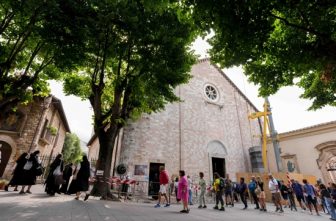Text of an Aug. 23 speech below comes from an address by Pope Leo XIV to an association of Catholic lawmakers from around the world gathered in Rome to consider how best to engage “the new world order.”
It calls all of us to recognize that the City of God and City of Man are fundamentally two spiritual realities ordered toward different loves: one is built around the love and worship of God, and the other is ordered differently to fulfill selfish desires. The two cities compete for the material order of creation, and when the City of Man prevails, structures of sin are created to enact the whims of the corrupt and powerful.
By contrast, Christians are called to build the civilization of love. In particular, the speech highlights that the vocation of Catholic legislators (and, by extension, all of us called to be faithful citizens) is to perform a politics of hope. A politics of hope fosters “integral human development,” which includes the person’s material development but also his or her spiritual development. The tools to build the City of God in public life are the perennial truths of natural law illumined by the Gospel, summarized in the body of teachings known as Catholic social doctrine.
— Jason Adkins, executive director, Minnesota Catholic Conference
You have gathered for your sixteenth annual meeting which has a thought-provoking theme this year: “The New World Order: Major Power Politics, Corporate Dominions and the Future of Human Flourishing.” In these words, I sense both a concern and a longing. We are all concerned about the direction our world is taking, and yet, we long for authentic human flourishing. We long for a world where every person can live in peace, freedom and fulfilment according to God’s plan.
To find our footing in the present circumstances — especially you as Catholic legislators and political leaders — I suggest that we might look to the past, to that towering figure of St. Augustine of Hippo. As a leading voice of the Church in the late Roman era, he witnessed immense upheavals and social disintegration. In response, he penned ‘The City of God,’ a work that offers a vision of hope, a vision of meaning that can still speak to us today.
This Church Father taught that within human history, two “cities” are intertwined: the City of Man and the City of God. These signify spiritual realities — two orientations of the human heart and, therefore, of human civilization. The City of Man, built on pride and love of oneself, is marked by the pursuit of power, prestige and pleasure; the City of God, built on love of God unto selflessness, is characterized by justice, charity and humility. In these terms, Augustine encouraged Christians to infuse the earthly society with the values of God’s Kingdom, thereby directing history toward its ultimate fulfilment in God, while also allowing for authentic human flourishing in this life.
(W)e must clarify the meaning of human flourishing. Today, a flourishing life is often confused with a materially wealthy life or a life of unrestricted individual autonomy and pleasure. The so-called ideal future presented to us is often one of technological convenience and consumer satisfaction. Yet we know that this is not enough. We see this in affluent societies where many people struggle with loneliness, with despair and a sense of meaninglessness.
Authentic human flourishing stems from what the Church calls integral human development, or the full development of a person in all dimensions: physical, social, cultural, moral and spiritual. This vision for the human person is rooted in natural law, the moral order that God has written on the human heart, whose deeper truths are illuminated by the Gospel of Christ. In this regard, authentic human flourishing is seen when individuals live virtuously, when they live in healthy communities, enjoying not only what they have, what they possess, but also who they are as children of God. It ensures the freedom to seek truth, to worship God and to raise families in peace. It also includes a harmony with creation and a sense of solidarity across social classes and nations. Indeed, the Lord came that we “may have life, and have it abundantly” (Jn 10:10).
The future of human flourishing depends on which “love” we choose to organize our society around — a selfish love, the love of self, or the love of God and neighbor. We, of course, already know the answer. In your vocation as Catholic lawmakers and public servants, you are called to be bridge-builders between the City of God and the City of Man. I would like to urge you this morning to continue to work for a world where power is tamed by conscience, and law is at the service of human dignity. I also encourage you to reject the dangerous and self-defeating mind-set that says nothing will ever change.
Inside the Capitol is a legislative update from Minnesota Catholic Conference staff.



